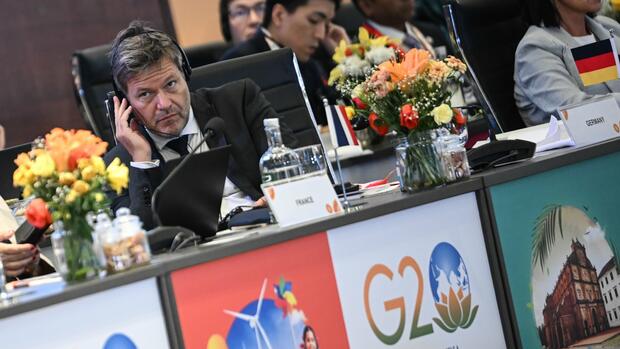goa Federal Economics Minister Robert Habeck (Greens) described the results of the G20 energy ministers’ meeting in Goa, India, as a “certain disappointment”. No agreement was reached on essential points. However, the Indian G20 presidency managed to formally save the summit, he said on Saturday in Goa after the meeting with his counterparts from the large industrialized and emerging countries. The meeting was overshadowed by the Ukraine war. Habeck accused the Russian side of a “completely twisted world view”.
In negotiating circles it was said that in his statement to his ministerial colleagues in a closed session, Habeck sharply criticized Russia’s war against Ukraine. Russia is “clearly the culprit”. That has to be named. Europe learned last year that Russia was using energy as a weapon. Gas deliveries had been stopped in order to trigger a gas shortage in Germany and Europe. Europe and Germany had felt what one-sided fossil dependencies meant. Renewable energies are therefore much more than a question of climate protection, they are a question of energy and economic security.
Russia’s Energy Minister Alexander Novak was not present at the meeting. Only his deputy Pavel Sorokin was connected via video. On site in Goa, Russia was represented by a department head from the ministry.
The meeting of energy ministers thus joins the series of high-level meetings on the international stage that have been overshadowed by the war in Ukraine. As expected, there was no joint final communiqué.
The goal of tripling the global expansion of renewable energies by 2030 is not found as a resolution of the G20 countries in the final document, but only in the summary of the Indian Presidency. There is currently 3.3 terawatts (TW) of renewable capacity installed worldwide, around 90 percent of which is in the G20 countries. From delegation circles it was said that the aim was to set a value of nine TW in a joint final communiqué. However, despite tough negotiations, this did not succeed.
Habeck: Some countries put the protection of industry ahead of responsibility for the climate
After all, “the vast majority of the G20” spoke out in favor of tripling it. According to the information, Russia and Saudi Arabia were among the countries that voted against ambitious targets for the expansion of renewable energies and thus prevented the necessary unanimity.
After the meeting, Habeck said it was inexplicable that some states put protecting their own industry ahead of shared responsibility for the climate.
Even the “ambitious language” sought by the German side for an exit from fossil energies, especially coal, was not able to win a majority in the end. “We would have wished for more,” said the German delegation.
>> Read also: Trade deal with India draws closer
Long comments on individual formulations without relevance to the content were characteristic of the Russian contributions during the negotiations that began on Wednesday, according to negotiating circles. Nevertheless, the G20 countries reached agreements on individual issues, such as access to energy and technologies for capturing carbon dioxide.
India aims to become a leader in green hydrogen production
The overall meager result is particularly disappointing for India’s G20 presidency. Prime Minister Narendra Modi is using this year’s G20 presidency to claim a leading role in the energy transition for his country and to assume a pioneering role among the emerging countries on the international stage. The expansion of renewable energies for power generation plays an important role here, as does the use of biofuels.
In addition, green hydrogen is said to play a key role in the country’s transformation. India has excellent conditions for producing electricity from renewable sources – a prerequisite for the production of green hydrogen. Green hydrogen is produced by using wind or solar power to operate electrolysers, in which water is separated into its components, oxygen and hydrogen. Green hydrogen is climate neutral.
India wants to become a global player in the production and export of green hydrogen. The country also wants to use the hydrogen itself to decarbonize industrial processes. Indian corporations have announced massive investments.
India had also focused on the topic of green hydrogen for the energy ministers’ meeting. In the final document, the G20 countries recognize the importance of green hydrogen as a “transformative technology” for the conversion of industrial processes, for example in the steel industry.
More: How EU regulation makes importing green hydrogen from India more difficult
